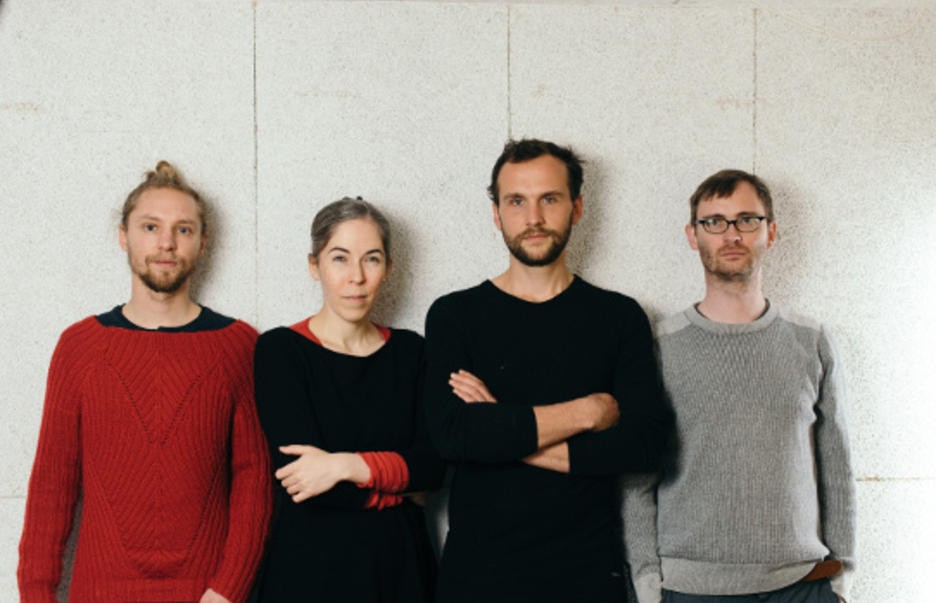This concert is featured in The New York Times' "8 Classical Music Concerts to See in N.Y.C. This Weekend"
Marco Fusi, violin, viola d’amore
Kukuruz Quartet: Philip Bartels, Duri Collenberg, Simone Keller, Lukas Rickli
Guest appearance by Adam Tendler
Salvatore Sciarrino: Fra sé
Giacinto Scelsi: Xnoybis I, II, III
Sciarrino: Capriccio di una corda
John Cage: The ten thousand things
Marcel Zaes: Quartet No. 10 for four electronic metronomes
Julius Eastman: Gay Guerrilla
Critic Alex Ross on Gay Guerrilla, the 1979 work for four pianos by American composer Julius Eastman (1940-1990):
"We are thrown into a world that is as much Romantic as minimalist: the harmony thickens incrementally; quiet episodes are juxtaposed with thunderous fortissimos; pentatonic interludes add an angelic sweetness. There is a sense of worlds forming, of forces gathering."
This concert includes two intermissions and ends at around 9:30 PM.
With kind support from the Consulate General of Switzerland in New York, and from Pro Helvetia – Swiss Arts Council.
Marco Fusi is a violinist/violist, and a passionate advocate for the music of our time. Among many collaborations with emerging and established composers, he has premiered works by Billone, Sciarrino, Eötvös, Cendo and Ferneyhough. Marco has performed with Pierre Boulez, Lorin Maazel, Alan Gilbert, Beat Furrer, David Robertson, and frequently plays with leading contemporary ensembles including Klangforum Wien, MusikFabrik, Meitar Ensemble, Mivos Quartet, Ensemble Linea, Interface (Frankfurt), Phoenix (Basel) and Handwerk (Köln).
Marco records for Kairos (Pierluigi Billone – ITI. KE. MI / Equilibrio. Cerchio), Stradivarius (Salvatore Sciarrino works for violin and for viola; John Cage, Freeman Etudes; Scelsi Collection Vol. 7), Col Legno, and Geiger Grammofon.
Marco also plays viola d’amore, commissioning new pieces and collaborating with composers to promote and expand existing repertoire for the instrument.
Marco teaches Contemporary Chamber Music at the Milano conservatory “G. Verdi”.
The Kukuruz Quartet was founded in 2014 in a corn field – “Kukuruz” means corn in several languages, and the Swiss-German expression “Mais machen” (literally “to make corn”) means to stir up mischief. The four pianists were first witnessed making their contribution to a production by musician and director Ruedi Häusermann at the Zurich Schauspielhaus. The quartet was performing on four so-called “well-prepared one-hand pianos”, having spent long sessions exploring different preparations and constructions. From the outset, the group has been engaged with classical music, jazz and improvisation. In the same year it was founded, Kukuruz also started its involvement with the works of Julius Eastman. They took Eastman's work on a tour through Switzerland, Germany and Holland, where they performed in concert halls, clubs, bars, and breweries, and made Eastman’s pieces accessible to a wide audience.
In 2017, their performance at documenta 14 in the Megaro Mousikis concert hall in Athens – where they exchanged their rickety instruments for concert grand pianos – earned a standing ovation. A recording of four Eastman piano pieces followed in November 2017 on four Steinway D pianos in the main hall of the historic Radiostudio Zürich (Intakt Records). In the summer of 2018, Kukuruz took Eastman’s work on a “guerrilla tour” through Switzerland, transporting its own pianos. The tour took the quartet to several juvenile offender institutions, hospitals, thrift shops, clothes stores, galleries, bars and office buildings. Kukuruz Piano Quartet features 4 pianists on the unfamiliar combination of 4 upright or 4 grand pianos and sheds new light on the music of Julius Eastman. They're a close-knit group of divergent artistic personalities, emergent from training in disparate musical fields: Simone Keller is a versatile pianist in contemporary and classical music, Philip Bartels is an experimental theatre stage director, Duri Collenberg studied composition in Amsterdam and Lukas Rickli has broad experience in improvisation.
Photo credit: Lothar Opilik
